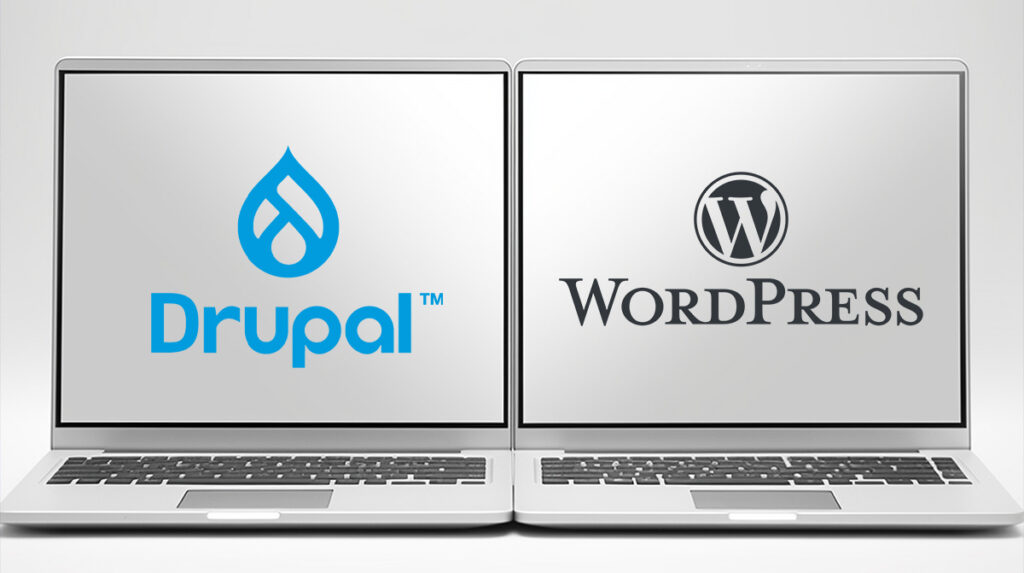If you’re planning to build a website, start a full-fledged blog, or optimize your newly developed website further, Squarespace and WordPress are among the best tools to choose from!
Squarespace is a multi-faceted website building SaaS (Software as a Service). Founded in 2004 in New York City, it started as a blog hosting service. Today, it’s well-known for its do-it-yourself/drag-and-drop feature. 2% of all websites in 2022 use Squarespace, as per W3 Techs.

WordPress, on the other hand, is a free and open-source CMS (Content Management System) that was launched as a blog-publishing system in 2003. The strongest features of WordPress are the plugin architecture, flexibility, and template/theme systems.
According to W3Techs, 43.2% of all websites in 2022 use WordPress. WordPress website development company has two variations: wordpress.org and wordpress.com. WordPress.org gives you advanced customization and monetization options while wordpress.com provides a quick and easy way to start off without any cost. It can be later expanded for more custom paid options.
While the ideal tool for you would depend on your requirements, both tools are known to be beginner-friendly. For example, Squarespace offers built-in features like galleries and pop-ups, including the ability to create a Squarespace lightbox to display images or videos in an elegant overlay
Here’s a Squarespace vs. WordPress comparison with a detailed account of the pros and cons of each so that you’re able to make a more informed decision. In addition, we’ve compared both under different categories like flexibility, user-friendliness, plugins, options for eCommerce, and pricing.
How Squarespace and WordPress Are Different?
| SQUARESPACE | WORDPRESS | |
| User-Friendliness Winner: Squarespace | Is a simpler tool that’s easy to learn and use. More beginner-friendly. | More flexible and comprehensive with a slightly higher learning curve. Could require basic coding. |
| Set Up Winner: Squarespace | With its overall simplicity and built-in tools, it is easy to set up. | May require more time and attention to set up due to its flexibility and options. |
| Flexibility Winner: WordPress | Is limited to just the tools that are built-in and existing integrations. Does not allow third-party plugins. | Is open-source, so you can tweak the codes. Highly flexible with a lot of options and allows a plethora of plugins. |
| Themes & Templates Winner: Tie | Has limited but highly aesthetic themes and templates. | Has a lot of options and paid/free templates/themes that can be integrated. |
| Plugins Winner: WordPress | Does not allow external third-party plugins. | Has a lot of flexibility and freedom to integrate various third-party plugins. |
| eCommerce Winner: Squarespace | Is scalable and supports selling physical/digital products as well as services. | Only supports selling digital/physical products. |
| SEO-Friendliness Winner: Tie | Allows configuration of meta titles, descriptions, and URLs. All plans have Google Analytics and social media integration. | Offers an auto-generated XML sitemap for better SERP visibility. Google Analytics and third-party plugins can be integrated with a Premium plan or above. |
| Affordability Winner: Tie | Has four all-inclusive plans available between $16-$49 per month. | Free at its basic version, offers four other plans ranging between $4-$45 per month. However, the charges can go up depending on external third-party plugins/themes/templates and the host used. |
Hopefully, the table above gave you a gist and an idea of what would be a better pick for you. There are a few more aspects to consider, though. For instance:
Which Is Better for Blogging, Squarespace or WordPress?
The answer is it depends entirely on your purpose for blogging. Both tools are highly adept for blogging. While WordPress is more powerful with its flexibility, openness to plugins, and of course, being an open-source platform, Squarespace is very user-friendly and easy to learn and manage.
When Is Squarespace a Better Choice?
When you’re just beginning to build a website and want something hassle-free and quick, Squarespace takes the lead. With its set boundaries, it’s easier to pick and choose; no code/technical knowledge/design knowledge is required!
When Should You Choose WordPress?
When you have an idea of the first draft of your website and want to optimize it further, WordPress can help you significantly. With its open-source nature, third-party plugins, and a little knowledge of design/coding, you have incredible customizability.
What’s more, migrating your website from Squarespace to WordPress is possible (via the self-hosted WordPress.org site) and can help you level up.
Here are some popular brand websites that use Squarespace and WordPress:
| Squarespace Website Examples | WordPress Website Examples |
| Gretel NY | PlayStation |
| Caylon Hackwith | Skype |
| Mike Perry Studio | Microsoft News |
| Yarza Twins | TED Blog |
| Architecture Plus Information | Vogue |
Let’s move on to a more detailed analysis of how Squarespace and WordPress compare against each other in the above mentioned aspects.
Squarespace Vs. WordPress: Comparing User-Friendliness?
As such, both Squarespace and WordPress have limited design freedom, which makes them ideal for beginners.
But because WordPress has a more comprehensive set of features, third-party plugins, and overall flexibility, it has a slightly higher learning curve. For customizations, there’s a very high possibility that you’ll need to use codes at one point or another.
Squarespace, on the other hand, has a lot of built-in tools, integrated options, and a block format that you can easily customize.
The verdict is that Squarespace is easier to learn and use and more beginner-friendly.
Squarespace Vs. WordPress: Which Platform Offers the Easiest User Experience?
With its ease of usage and beginner-friendly features, Squarespace is also easier and faster to set up.
WordPress requires more time and attention to get accustomed to. The catch, though, is that WordPress still offers more hosting options.
Flexibility Showdown: Squarespace Vs. WordPress?
Squarespace is known for its easy, customizable, and highly aesthetic templates. But what makes it so easy also makes it less flexible. You can only play within the arena of Squarespace’s built-in tools and integrations. It does not support external plugins and add-ons.
In comparison, flexibility is the strongest suit of WordPress. Being open-source makes it easy for you to access and customize the codes. You can configure your server, customize your themes on a more advanced level, and choose your pick from the 11,000+ plugins!
Needless to say, WordPress is the clear winner here.
Choosing the Best Themes & Templates?
Like flexibility is WordPress’ strong suit, effortlessly beautiful themes are Squarespace’s. Most Squarespace websites inherently look beautiful because Squarespace themes are designed so well.
WordPress has a single theme, but you can choose from its vast marketplace of free and paid themes. Theme Forest, the largest market, for example, has over 48,000 themes and website templates. WordPress.org has about 4,000 free themes too.
Therefore, the verdict here varies. While Squarespace gives you aesthetic but limited themes, WordPress plays in large numbers.
WordPress Vs. Squarespace: Comparing Available Plugins
As you’d already know, Squarespace is a limited playground with built-in tools. Although it has a small selection of Extensions you can try, they’re mainly for eCommerce.
However, WordPress allows you to choose and implement a plethora of plugins per your requirement. You can explore and pick from 11,000+ free and paid plugins. Yoast SEO, Tablepress, Elementor, and Buddypress are a few examples. A catch here is that you must check and ensure that the plugins you install are compatible with your theme.
WordPress is hands-down the better platform here.
Ecommerce Face-Off: Squarespace Vs. WordPress
Squarespace eCommerce platforms provide support to sell physical products, digital products, as well as services. You can opt for the Squarespace Business, Basic Commerce, or Advance Commerce plan. WordPress’ eCommerce platform – WooCommerce, only supports selling digital and physical products. It also includes premium design options and integrations, but Squarespace is still a better option for eCommerce.
Due to its scalability and options, Squarespace is a winner here.
Squarespace Vs. WordPress: Which Reigns Supreme in the Digital Realm?
Squarespace’s significant feature is that you can configure meta titles, descriptions, and custom URLs. In addition, all plans come with Google Analytics and easy social media integration. However, a major drawback is that you can’t install third-party SEO plugins like Yoast on Squarespace and only have the built-in options to utilize.
In a similar vein, WordPress does have configuration options, but it offers XML sitemaps that are auto-generated for better SERP visibility. You can install Google Analytics and other third-party plugins to optimize your SEO only with a Premium plan or above (Business and eCommerce).
There is no clear winner here. It’s a tie!
WordPress Vs. Squarespace: Which Is More Budget-Friendly?
How much does Squarespace cost?
Squarespace gives you four all-inclusive monthly plans for $16-$49. When purchased annually, you can save better and include hosting, templates, and domain registration in your plan. For eCommerce, the plan goes more to the higher side.
How much does WordPress cost?
WordPress is free at its basic level, but a decent host will cost almost the same as a Squarespace plan. While you can dabble with the free themes and templates, the better ones can cost you anything between $39 to $120 – for a lifetime. The same goes for plugins. WooCommerce, for example, has extensions up to $299. In terms of the plans, the four plans other than the free basic version cost between $4-$45 per month.
You’ll note that both Squarespace and WordPress are similarly priced. It all comes down to your requirements.
Here’s a look at the detailed pricing for both tools:
| SQUARESPACE | WORDPRESS | ||
| PLAN | ANNUAL CHARGES | PLAN | ANNUAL CHARGES |
| -Best for Getting Started -Free Themes -Pre-installed SSL Certificate -1GB Storage | FREE | ||
| PERSONAL-Unlimited bandwidth-Video Storage-SEO Features for Site Visibility | $16 per month | PERSONAL-Free domain for one year-Best-in-class Hosting -Collect Payments -Remove ads -Unlimited eMail Support | $4 per month |
| BUSINESS-Premium Integrations & Blocks-Video Storage-Fully Integrated eCommerce | $23 per month | PREMIUMAll Personal features + -Live Chat Support -Earn Ad Revenue -Premium Themes -Upload Videos -Google Analytics Integration | $8 per month |
| BASIC COMMERCEAll Business features +-No Commerce Transaction Fees-Checkout on Your Domain-Customer Accounts | $27 per month | BUSINESS All Premium features + -Install Plugins -Advanced SEO Tools -Jetpack Backup -SFTP, SSH, WP-CLI, Database Access | $25 per month |
| ADVANCED COMMERCE All Basic Commerce features +-Abandoned -Cart Recovery-Gift Cards-Sell Subscriptions | $49 per month | ECOMMERCE All Business features + -Accept Payments in 60+ Countries -Top Shipping Carriers Integration -Premium Designs for Online Stores | $45 per month |
Once again, there is no winner in terms of affordability. Instead, it depends on what plans and add-ons you choose.
Conclusion: Is WordPress the Best Squarespace Alternative?
Hopefully, by now, you have a clearer idea of which tool to pick for your needs. While we’ve tried to list out all the pros and cons we thought were important, here’s a look at the overall statistics.
- As mentioned, 2% of all websites in 2022 are powered by Squarespace. In comparison, WordPress powers 43.2%.
- Squarespace sites increased by 0.7% in its first ten years, while WordPress sites increased by 30%.
- WordPress stands at 116 on the global ranking, while Squarespace is at 1,420.
So, regarding popularity, WordPress is a clear winner in the Squarespace vs. WordPress debate.
But the website you build will always have a unique purpose and a unique set of requirements. We’d recommend weighing the pros and cons of each according to your needs and then taking a call. You can always improvise!
FAQs
Squarespace and WordPress are two popular tools for building websites. Squarespace is a multi-faceted website building SaaS, founded in 2004 in New York City, and well-known for its do-it-yourself/drag-and-drop feature. WordPress, on the other hand, is a free and open-source CMS (Content Management System) that was launched as a blog-publishing system in 2003. It is highly flexible and allows a plethora of plugins.
The main differences are user-friendliness, setup, flexibility, themes and templates, plugins, eCommerce, SEO-friendliness, and affordability. Squarespace is simpler and more beginner-friendly, while WordPress is more flexible with a higher learning curve. Squarespace is easier to set up due to its overall simplicity and built-in tools, while WordPress may require more time and attention to set up due to its flexibility and options. WordPress is highly flexible and allows a lot of options, while Squarespace is limited to just the tools that are built-in and existing integrations. WordPress also allows a plethora of third-party plugins, while Squarespace does not allow external third-party plugins.
Both tools are highly adept for blogging. While WordPress is more powerful with its flexibility, openness to plugins, and of course, being an open-source platform, Squarespace is very user-friendly and easy to learn and manage. The choice between Squarespace and WordPress for blogging depends entirely on your purpose for blogging.
When you’re just beginning to build a website and want something hassle-free and quick, Squarespace takes the lead. With its set boundaries, it’s easier to pick and choose; no code/technical knowledge/design knowledge is required. When you have an idea of the first draft of your website and want to optimize it further, WordPress can help you significantly. With its open-source nature, third-party plugins, and a little knowledge of design/coding, you have incredible customizability.
Both Squarespace and WordPress have limited design freedom, which makes them ideal for beginners. But because WordPress has a more comprehensive set of features, third-party plugins, and overall flexibility, it has a slightly higher learning curve. Squarespace, on the other hand, is simpler and more beginner-friendly.
Related Articles
-
The Ultimate Guide To Hiring Developers for Your Startup: Tips for Non-Tech Founders
Are you a non-technical founder establishing a tech-oriented startup? Hiring developers for your startup can be a crucial step towards overcoming the challenges that come with being a first-age entrepreneur.
-
Top 6 WordPress SEO Plugins That You Should Use!
Everybody wants to bring organic traffic to their websites for that many even hire WordPress Development Company to create SEO Friendly website. To be more specific, who doesn’t love to
-
Tips To Create A Multi-lingual E-Commerce website Using WooCommerce and WordPress
It is a fact that people across the globe speak different languages. Therefore, since everybody cannot go with a single language, it is essential to have the necessary multi-language features




